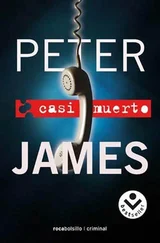Peter James - Perfect People
Здесь есть возможность читать онлайн «Peter James - Perfect People» весь текст электронной книги совершенно бесплатно (целиком полную версию без сокращений). В некоторых случаях можно слушать аудио, скачать через торрент в формате fb2 и присутствует краткое содержание. Жанр: Триллер, на английском языке. Описание произведения, (предисловие) а так же отзывы посетителей доступны на портале библиотеки ЛибКат.
- Название:Perfect People
- Автор:
- Жанр:
- Год:неизвестен
- ISBN:нет данных
- Рейтинг книги:4 / 5. Голосов: 1
-
Избранное:Добавить в избранное
- Отзывы:
-
Ваша оценка:
- 80
- 1
- 2
- 3
- 4
- 5
Perfect People: краткое содержание, описание и аннотация
Предлагаем к чтению аннотацию, описание, краткое содержание или предисловие (зависит от того, что написал сам автор книги «Perfect People»). Если вы не нашли необходимую информацию о книге — напишите в комментариях, мы постараемся отыскать её.
Perfect People — читать онлайн бесплатно полную книгу (весь текст) целиком
Ниже представлен текст книги, разбитый по страницам. Система сохранения места последней прочитанной страницы, позволяет с удобством читать онлайн бесплатно книгу «Perfect People», без необходимости каждый раз заново искать на чём Вы остановились. Поставьте закладку, и сможете в любой момент перейти на страницу, на которой закончили чтение.
Интервал:
Закладка:
‘What do you mean by that?’
‘Did you really want to do the best for us? Or did you want to satisfy your cravings as a scientist?’
He braked more harshly than he needed at the end of the street. ‘You don’t trust me, do you?’
‘I don’t know what I think any more, John.’
‘That’s very hurtful.’
She shrugged.
‘Naomi, I’ve always told you the truth. When I first found out about Dr Dettore, I told you everything I knew, and I warned you there would be a risk in going to him. We both agreed to take a chance.’
‘Maybe you didn’t spell it out quite loudly enough,’ she said bitterly.
‘Perhaps you didn’t listen quite hard enough,’ he replied gently.
She turned and stared at him. Stared at the man she had once loved madly, wildly, crazily. The man she had been through so much with. The man who had given her the strength to get beyond the loss of their son, and the will to go on living.
Stared at him with a hatred so intense that if she’d had a knife in her hand, she honestly believed at this moment she could have stabbed him with it.
62
The day began in the monastery of Perivoli Tis Panagias the same way it had begun every morning for the past eleven centuries. At two thirty in the morning, beneath a sky still crowded with stars, the knock of wood on wood rang out. The summons to matins.
In the marbled glare of moonlight, the stark drumming rose to a frenzied crescendo that was more a shamanic beat than a gong. It rang out across the shadows of the courtyard, echoing off the worn flagstones and the cracked, peeling fortress walls surrounding the mostly derelict buildings.
In his cell the Abbot rose from his narrow bed, lit the oil lamp on his dressing table, crossed himself beneath the portrait of the Virgin Mary, and dressed quickly in his black robes.
When he had first entered this monastery as a young novice, sixty-four years ago, it had been Yanni Anoupolis’s task to rise first, and go out and call the brothers to prayer, by hammering with the mallet on the ancient teak plank hung from rusty chains in the cloistered courtyard. Then he had been a young man of twenty-two, whose heart had ached to serve God.
Now it wasn’t just his heart that ached, but so much else, also, especially his knees and his hips. The body that housed him was decaying just like the buildings that housed the few remaining monks here. His eyesight was steadily failing, month by month, and so was his energy; he did not know how much more time God would spare him, but at least he had the comfort of knowing that after years of uncertainty, the future of the monastery, perched high on this rock atoll in the Aegean Sea, twenty kilometres south of the Greek mainland, was assured.
Father Yanni pulled his cowl up over his head, then, supporting himself on his stick, walked down the stone steps and into the courtyard, the reek of burning oil from the lamps in the church porch offering scant but welcome relief against the sharp, damp sea air. Behind him he heard the footsteps of three of the four other monks who remained from an original community of one hundred and ninety, when he had first come here.
Entering the rear of the church he crossed himself again, then stood for some moments in humble silence in front of the beautiful Madonna and Child icon. The blessed Virgin Mary! She protected them all on this island. And she had rewarded him for his lifetime of devotion by bringing the American here to save them.
He wondered if the American would be joining them for matins. Some mornings the American sat beside him, usually accompanied by young novices. Other days, the American had told him, he preferred to hold his own private prayer vigil in his room.
Father Yanni loved to see these novices in here, all such gentle, polite young men. So sincere, so devout, so dedicated, praying with such vigour and fervour. The energy of youth!
The American’s name was Harald Gatward. He was a good man, the Abbot knew that much, but he knew little else about him. Only that the Virgin Mary had brought him here – which was all that he needed to know.
The monastery of Perivoli Tis Panagias had been built in the ninth century as a remote offshoot of the Holy Mount Athos, providing an alternative haven for Greek Orthodox monks. They lived an ascetic life here. Worldly pleasures were strictly forbidden – these were temptations by Satan to distract and corrupt. This included chatter. Conversation was strictly on a need-to-know basis. Idle gossip led to malcontent and sin.
The Abbot was the only monk on the island who spoke any English, and his grasp of this language was limited and mostly archaic. He assumed the American must be a very rich man. When the Council of the Greek Orthodox Church had made the decision that they could no longer justify the cost of running Perivoli Tis Panagias for just five monks and had placed the tiny island on the market, hoping to attract a property developer to turn it into a resort, the American had outbid everyone. And this wonderful man had assured the Abbot that it was God’s will that he and his four fellow brothers should live out their lives in peace here.
Of course there had been a few changes. The biggest of these was the new buildings, and women arriving on the island. But they were housed beyond the monastery walls, and none of them had ever encroached on the church, nor entered the refectory.
*
In his tiny cell, even more modest than the Abbot’s and lit by a solitary candle, Harald Gatward knelt beside his bed, face buried in his hands, communing with the Lord in a prayer vigil he had held, with only one short break to check his emails, since eleven o’clock last night.
Gatward was a shambling bull-necked giant of a man, six-foot-six-inches tall, with a baby face that belied his fifty-eight years, and a mane of shaggy, greying hair that hung down from either side of his bald dome. A former colonel of the 51st Airborne, Gatward had been decorated for courage under fire in Vietnam.
And later that same year, on that same field where he had earned his honours, he had held the charred body of his fiancee in his arms as she died. An over-enthusiastic US military helicopter had inadvertently dumped several gallons of self-igniting chemical defoliant onto a field hospital and its staff, just as he was arriving to collect Patty at the end of her shift.
She had run towards him, her clothes, her hair, her hands, her legs, her face all burning, screaming for help. He’d rolled her over on the ground, torn his own clothes off and bound them around her to smother the flames. But no sooner had they gone out than like some joke candle on a birthday cake they reignited.
Later, long after the flames had died and she had begun to cool, her skin suddenly slipped away from her chest and her arms, as if he was easing her out of a coat.
‘Dear God,’ Harald Gatward said as he kneeled against the bed, ‘when you created man you made him in your likeness.’ After a brief pause he repeated the same line. ‘Dear God, when you created man you made him in your likeness.’ And then he repeated it again.
No human being should ever have to die the way Patty died, Harald Gatward believed. Chemicals had killed her. Man messing around with chemicals caused all kinds of problems in the world. All the bad shit. It was Satan who put the formulae into people’s heads. Now stupid, hubristic man was no longer messing around just with chemicals, he was fooling around with human life itself. Doing all kinds of shit with genes.
God had informed Harald Gatward throughout his life. He had told Harald how to turn the inheritance from his father, who had made a sizeable fortune with auto spares manufacturing plants in Asia, into a multi-billion-dollar global empire. He had told Harald that it was right to go to Vietnam and fight for his country. He had shared many secrets with Harald over the years, many insights, many visions. He brought Harald to the monastery of Perivoli Tis Panagias to save the monks. That was important but that was only a small part of the reason he had come here.
Читать дальшеИнтервал:
Закладка:
Похожие книги на «Perfect People»
Представляем Вашему вниманию похожие книги на «Perfect People» списком для выбора. Мы отобрали схожую по названию и смыслу литературу в надежде предоставить читателям больше вариантов отыскать новые, интересные, ещё непрочитанные произведения.
Обсуждение, отзывы о книге «Perfect People» и просто собственные мнения читателей. Оставьте ваши комментарии, напишите, что Вы думаете о произведении, его смысле или главных героях. Укажите что конкретно понравилось, а что нет, и почему Вы так считаете.











